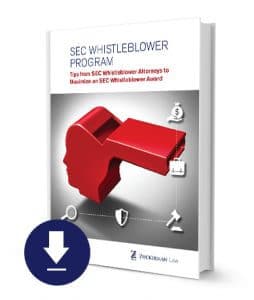SEC Awards for Disclosures of Foreign Bribery or FCPA Violations
Under the SEC Whistleblower Program, the SEC pays awards to whistleblowers who provide original information, including information about FCPA violations, that leads to enforcement actions with sanctions in excess of $1 million. A whistleblower is eligible to receive an award of between 10-30 percent of the total sanctions imposed. If represented by an attorney, a whistleblower may submit a tip anonymously to the SEC.
Contact us today to find out the strategies we have successfully employed to secure awards for whistleblowers disclosing fraud to the SEC.
Since 2012, the SEC has issued approximately $1.8 billion in SEC whistleblower awards. The largest SEC whistleblower awards to date are $114 million and $50 million. The penalties imposed for FCPA violations have been substantial, which can lead to large SEC whistleblower awards (see more below).
Retaining an experienced SEC whistleblower law firm can help you increase your chance of obtaining a substantial reward. We have represented whistleblowers disclosing bribery and FCPA violations worldwide, including in China, Angola, Central America, the Middle East, and Europe. And we helped an FCPA whistleblower obtain a multi-million dollar recovery.
Find out today if you might qualify for an SEC whistleblower award. Contact the Director of our SEC whistleblower practice at [email protected] or call our leading SEC whistleblower lawyers at (202) 930-5901 or (202) 262-8959.






In FY 2021, the SEC received more than 12,200 whistleblower tips—the largest number of whistleblower tips received in a fiscal year, which represents an approximate 76% increase over FY 2020. Approximately 258 of those tips alleged FCPA violations.
Foreign Bribery and FCPA Violations
According to SEC guidance, the FCPA prohibits the payment of bribes to foreign officials to assist in obtaining or retaining business. This anti-bribery provision broadly applies to:
- U.S. persons;
- U.S. and foreign public companies that are listed on the stock exchanges in the United States or that are required to file periodic reports with the SEC; and
- certain foreign persons and companies that are acting while in U.S. territory.

The FCPA also requires issuers to maintain adequate internal controls. These controls must provide reasonable assurance that transactions are executed and that assets are accessed and accounted for in accordance with management’s authorization. By maintaining these controls, companies are able to provide more accurate books and records. Common violations of the FCPA internal-control provision include:
- falsifying documents to conceal bribery payments;
- fraudulently mischaracterizing bribes as normal business expenses;
- overbilling with an understanding that some of the payment is a bribe; and
- inappropriate hiring practices, such as hiring candidates solely based on referrals by client executives and government officials.
Importantly, there is no “materiality” consideration under the books-and-records provision of the FCPA—any failure is considered a statutory violation.
SEC and DOJ Anti-Bribery Enforcement Actions
The SEC and Department of Justice (“DOJ”), which are the agencies charged with enforcing the FCPA, have aggressively pursued foreign bribery cases. Since the enactment of the FCPA, the agencies have prioritized the Act and have imposed substantial fines on companies for violations. Examples include:
- In 2008, Siemens AG agreed to pay $350 million in disgorgement to settle the SEC’s charges of violating the FCPA, as well as a $450 million fine to the DOJ to settle criminal charges.
- In 2014, ALCOA paid $175 million in disgorgement of revenues to the SEC and a fine of $209 million for bribing government officials in Bahrain.
- In 2014, Marubeni Corporation agreed with the DOJ to pay an $88 million fine for paying bribes to Indonesian officials in order to secure business.
- In 2016, Och-Ziff Capital Management Group LLC agreed to pay $413 million to settle charges that the hedge fund violated the FCPA by using intermediaries and business partners to pay bribes to government officials in Africa.
- In 2016, JPMorgan Chase agreed to pay $264 million in sanctions for a client-referral hiring program called the “Sons and Daughters Program.” This program was expressly designed to hire candidates referred by client executives and government officials. By employing these referrals, the bank was able to win business that generated millions in revenues. From 2006 to 2013, JPMorgan did not deny a single referral from the program. This enforcement action represents the third time the SEC has fined a company for hiring officials’ relatives in violation of FCPA. Andrew Ceresney, SEC Enforcement Division Chief, has indicated that the SEC will continue to sweep the referral hiring practices.
- In 2016, engineering conglomerate Odebrecht and Braskem agreed to pay a total of $3.5 billion in a record FCPA settlement with U.S., Brazilian, and Swiss authorities. Beginning in 2001, the companies used a hidden business unit to pay hundreds of millions of dollars in bribes to corrupt foreign officials in the Petrobras corruption scandal.
- In 2016, Teva Pharmaceutical Industries Ltd. agreed to pay $519 million to settle U.S. charges that it violated the FCPA by paying bribes in its operations in Ukraine, Mexico, and Russia. The U.S. has extensively enforced the FCPA on pharmaceutical firms over the years, especially in countries with national health systems. In these countries, doctors are considered “public officials” for FCPA purposes, which dramatically increases their exposure to FPCA violations. Also in 2016, pharmaceutical giants GlaxoSmithKline, AstraZeneca, and Novartis all settled cases involving FCPA violations.
- On January 16, 2017, Rolls-Royce agreed to pay $809 million to settle allegations of a long-running scheme to bribe government officials in exchange for government contracts. The settlement proceeds were split between the UK, the United States, and Brazil. The Department of Justice reported that it received nearly $170 million. Read more here.
- On January 18, 2017, medical device company Orthofix International agreed to pay more than $14 million to settle charges that it made improper payments to doctors at government-owned hospitals in Brazil in order to increase sales and improperly booked revenue causing the company to materially misstate financial statements from at least 2011 to Q1 2013.
FCPA Whistleblower Lawyers
The FCPA whistleblower lawyers at leading SEC whistleblower firm Zuckerman law represent whistleblowers worldwide in disclosing fraud and other violations to the SEC Whistleblower Program, the CFTC Whistleblower Reward Program, and the IRS Tax Fraud Whistleblower Program.
If you are seeking representation in an SEC whistleblower bounty case, click here, or call us at 202-262-8959 to schedule a free, confidential consultation.






FCPA Whistleblower Bounty Attorneys
To learn more about the SEC Whistleblower Program, download Zuckerman Law’s eBook: SEC Whistleblower Program: Tips from SEC Whistleblower Attorneys to Maximize an SEC Whistleblower Award:
- See our column in Going Concern: Sarbanes-Oxley 15 Years Later: Accountants Need to Speak Up Now More Than Ever.
- See our post in Accounting Today: Whistleblower Protections and Incentives for Auditors and Accountants.
- See our post in The Compliance and Ethics Blog: Shkreli Trial Reveals the Challenges Faced by Compliance Whistleblowers.
Qualifying for an FCPA SEC Whistleblower Reward
SEC Whistleblower Process and FCPA Cases
Protecting Whistleblowers Who Disclose Foreign Bribery or Foreign Corrupt Practices Act Violations
Disclosing bribery or a violation of the Foreign Corrupt Practices Act can be protected under various federal and state whistleblower protection laws, including the whistleblower protection provisions of the Sarbanes-Oxley Act. SOX provides robust protection to corporate whistleblowers, and indeed some SOX whistleblowers have achieved substantial recoveries. In 2017, a former in-house counsel at a biotechnology company recovered $11 million in a SOX whistleblower retaliation case alleging that the company fired him for disclosing violations of the Foreign Corrupt Practices Act.
Drawing on our substantial experience representing corporate whistleblowers, we have published a free guide to SOX titled Sarbanes-Oxley Whistleblower Protection: Robust Protection for Corporate Whistleblowers
The goal of the guide is to arm corporate whistleblowers with the knowledge to effectively combat whistleblower retaliation, avoid the pitfalls that can weaken a SOX whistleblower case, and formulate an effective strategy to obtain the maximum recovery.
If you have suffered retaliation for whistleblowing, contact us to schedule a free preliminary consultation.





